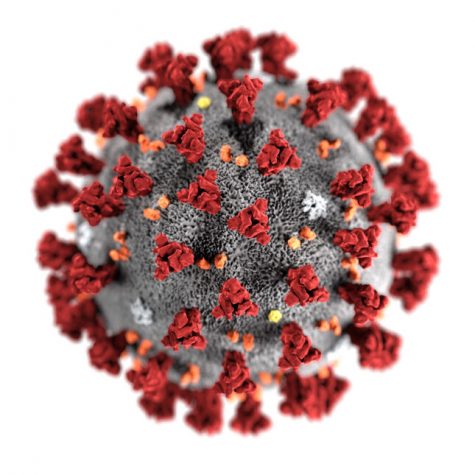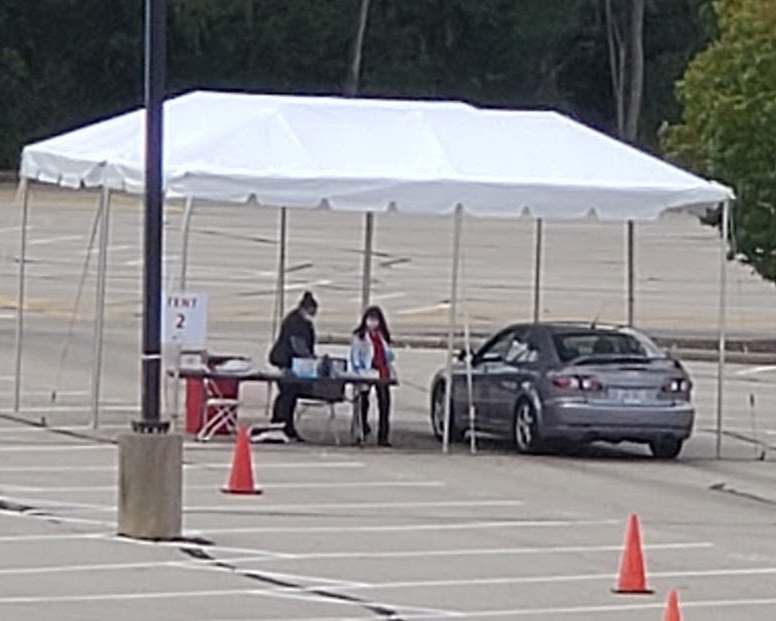Miami requires students to receive COVID test when returning to campus
As shown in this photo from last fall, students living in dorms will be able to receive drive-thru testing in the Millett Hall parking lot during check-in next week.
January 15, 2021
All Miami University students returning to Oxford for the start of spring semester Jan. 25 must take a COVID-19 test before they can start classes, the university announced Wednesday.
Just like last semester (and the semester before), the ongoing COVID-19 pandemic poses a number of challenges for the university.
“Rates of COVID-19 in the U.S. are higher now than at any point since the pandemic began, so our precautionary measures must remain in place or increase,” said the announcement from Jayne Brownell, the university’s vice president for student life.
According to the Ohio Public Health Advisory System, the number of cases in Butler County are categorized as a level 3 public emergency, with very high exposure and spread. So, while many had high hopes for the new year and spring semester, students will return to Oxford under restrictions similar to when they left.

Despite record-high cases, Brownell said in her statement she is confident in the university’s plans for the upcoming semester.
“We can’t be easing restrictions at this point, we have to be keeping people safe,” said Brownell. “The good news is that we are more prepared than ever.”
With a semester of experience behind it, the university plans to enforce a number of new and improved policies and procedures to help minimize the risk of the virus.
Testing will be mandatory for all students
The greatest improvements are in the realm of testing, according to the university.
In a statement released on Jan. 8, the university introduced its Spring 2021 Arrival Testing Program. According to the statement, any student who plans to take an in-person or hybrid course, work for a campus department or office or be physically on campus this spring will need to participate in the mandatory testing.
Arrival testing procedures, which began Jan. 11, differ depending on a student’s living arrangements.
Students living in on-campus housing will be tested in the Millett Hall parking lot during their assigned move-in date and time.
Off-campus students will be tested at Harris Hall, 500 Harris Drive, and need to sign up for an appointment to do so before classes begin. At this appointment, students will receive a COVID-19 Arrival Testing Card which they will be required to carry on campus until Feb. 3 to access university facilities.
In addition to the Arrival Testing Program, Miami plans to utilize new types of testing for the upcoming semester.
According to Brownell, the university now has access to new PCR saliva testing, which directly tests for a viral genome in the saliva. While these PCR tests do not provide a final positive diagnostic result, they are time and cost efficient and can detect the presence of the virus earlier than other tests.
“This means we can see more people at a faster rate and get a good sense of who needs that diagnostic test,” Brownell said.
This new testing allows the university to test certain groups of students, like those with nursing or teaching placements, more frequently. Additionally, Miami plans to test certain staff members more frequently, like those working in dining and residence halls.
As it did in the fall, the university will continue its wide-net and surveillance testing programs.
Putting those exposed in quarantine or isolation
Miami has also made a number of changes to the quarantine/isolation protocol.
In December, the CDC changed its quarantine guidelines, reducing the quarantine period to 10 days with no symptoms. Miami has adopted this policy as well.
Additionally, the university has switched the quarantine and isolation buildings. Now, those who are quarantined will have a space with a private bathroom, while those in isolation will share a common bathroom facility.
Overall, Miami hopes to improve the isolation/quarantine experience for students, giving them access to microwaves and the option to order non-contact delivery once staff leaves.
“We learned a lot about how to support people when in isolation and quarantine,” Brownell said. “We’re hoping to make that a less unhappy experience.”
Holding classes during the pandemic
Unlike in the fall, Miami will start spring semester with in-person learning. Professors were given the option to select the modality of their courses — in person, online or a hybrid of the two, and will not be able to change this selection. According to Brownell, about half of all classes will be in a face-to-face environment.
In regards to course grading selections, the credit/no-credit option will revert back to university policy prior to the COVID-19 pandemic.
Vaccinations against the virus
According to Brownell, Miami is working on a plan with all Ohio schools regarding the distribution of vaccines. It hopes to have a state-approved plan in place for February.
“They’ll get here when they get here,” Brownell said of the vaccines. “But when they get here, we’ll be ready.”














